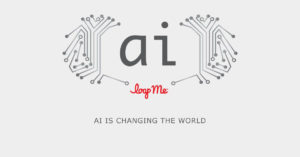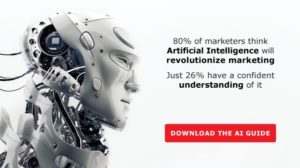 LoopMe is the largest mobile video platform, supporting all video and full-screen formats and reaching over 2 billion devices worldwide.
LoopMe is the largest mobile video platform, supporting all video and full-screen formats and reaching over 2 billion devices worldwide.
We had a chance to catch up with their CEO, Stephen Upstone during the Cannes Lions Festival, who revealed to us the company’s foray into Artificial Intelligence and discussed the impact the technology will have on the Mobile Marketing Industry:
Q) Give us brief introduction to LoopMe?
A) We specialise in using Artificial Intelligence (AI) to improve results for brands and advertisers. LoopMe is the largest mobile video platform that uniquely uses AI to drive better results. We have the mission to improve mobile advertising for advertisers, publishers and end-users alike, by providing more engaging ad formats that improve the user experience and delivers better performances and results.
For the last year we have been optimizing against real outcomes like: will this user go into store; will they buy a product; do they tend to buy a product; have they changed their point of consideration around trust with respect to the brand.
Q) What is your blueprint for LoopMe for the next few years?
A) We have grown well now, we have about 15 offices globally. We are trying to work closely with agencies and brands to help them to not only understand what the real world outcomes are after serving video advertising, but also to optimize those outcomes using AI and then to provide analytics back to the same advertisers and agencies to improve their strategies and products.
That’s what we are working on under a product called Purchase Loop, which has three parts to it. The first part is optimizing purchase intend and brand affinity so it runs methodology that is similar to on device research. It allows us to optimize whilst the campaign is running based on understanding, if I show a video ad to someone, do they change their trust or purchase intend to this brand?
The second part of the product is around foot traffic. If I show this video ad, will someone go into the store? Is this person going to be in store, within the next 48 hours or so?
And then the third part that we are working on now is around real offline sales. 90% of what is purchased is still offline. We want to understand the relationship between showing video content and people actually taking some kind of outcome.
Q) How do you see the Mobile Marketing Industry evolving in the future?
A) I think the industry as a whole is moving from what has been a huge movement in consumer acceptance towards a better understanding about what marketers were buying. There was a lot of work on viewability, safety and standard metrics.
 And now the market is shifting very quickly to understand the outcomes created by advertising and that’s really why we’re all here. We’re creating ads that change people’s understanding, consideration of or trust within, a brand and get them excited to buy products and feel better about those products. That now can be much more measured. There is a lot of data providers out there who can help on measurements and there is a need for good independent and third party verification on what’s actually creating value.
And now the market is shifting very quickly to understand the outcomes created by advertising and that’s really why we’re all here. We’re creating ads that change people’s understanding, consideration of or trust within, a brand and get them excited to buy products and feel better about those products. That now can be much more measured. There is a lot of data providers out there who can help on measurements and there is a need for good independent and third party verification on what’s actually creating value.
So I think we are at a very interesting point in time. The other thing that is interesting is, as we move brand advertising from traditional being very TV centric, to being digital centric but still video at the heart of it, then the channel makes a change as well. This creates all sorts of creative challenges and opportunities for brands to be able to create scalable experiences that can move large audiences very effectively.
The key areas, where LoopMe is interested, are around AI. We are right at the beginning of that journey if you look at how almost all advertising that is optimized is still manually processed with ad operations, using segments that are being created using lots of very good data but they are still shifting and manually optimizing often with segments. That’s a dramatically change. Artificial intelligence will affect other parts of service delivery and customer interface as well, but even just within the world of communication, ad delivery is going to make a big impact.
Q) The MMA and WARC recently released a report, which said that marketers in EMEA are budgeting for mobile, but the strategy and measurement are lacking. What are your thoughts on this? How can this be improved going forward?
A) I think a lot of big brands think cross-platforms, they do not think what is my mobile strategy so to speak, and I think if you are not careful, that can hide what’s really going on, it allows lazy thinking to continue where people actually still use old methods when the world has changed.
I think it is important to think about people and consumers, not necessarily platforms, but you should understand the contribution from many platforms, just like you would understand the contributions from any retail channel or any other partner, and those questions that data should be readily available are in the mind of every marketer.
In key markets, 70% of the time we spend digitally is on our phones, so if you don’t understand the contribution from mobile to your bottom line as a marketer or business owner, then you’re missing a big opportunity.
I would go further than that and say there are a number of big companies, that have developed themselves as a mobile brand, a mobile first brand and they have seen huge benefit from that. People like Amazon, Google, Facebook, Snapchat and eBay, are all understood as creating mobile first businesses. If businesses don’t trust mobile into the concentration of senior management then there is a possibility they will miss the opportunity or worse than that, their competitors will get a stronger march.
 I still think there is a lot of opportunity for improvement around those areas, as I look forward I think the bigger issue is actually going to become around AI. Recently Google came out and said that it was an AI first company. Also, I have seen some data suggesting that Amazon probably thinks in a similar way. Yet I think there was a study recently that said over 80% of marketers thought that AI would revolutionise their industry and yet only 26% of them felt they have a good understanding of it.
I still think there is a lot of opportunity for improvement around those areas, as I look forward I think the bigger issue is actually going to become around AI. Recently Google came out and said that it was an AI first company. Also, I have seen some data suggesting that Amazon probably thinks in a similar way. Yet I think there was a study recently that said over 80% of marketers thought that AI would revolutionise their industry and yet only 26% of them felt they have a good understanding of it.
So there is a huge kind of knowledge and opportunity gap around AI, for many people that are still trying to catch up with the last technology as well. A few big shifts coming that need the marketers to make sure they stay on top of their data strategy and their AI strategy, in order to not get left behind.
Q) When it comes to digital and new age tech, do you think it’s more important for agencies and brands to start building campaigns around these tools or should they be incorporated as an aspect of a greater idea?
A) The opportunities afforded by new technology, we are only just coming to terms with. So if you don’t have individuals that are very close to trying to work out what that means with brands then again, you may be left behind. Look at AI and Voice Interface that is happening really rapidly now. My daughter is eight, whenever she goes to use the phone her first action is to try Siri. I’ve even turned off Siri in the past, so there are very different opportunities there that are ought to be taken up.
There is a change in opportunity for big brands now, more and more they are buying their own DMP, so they are investing in their own unique data and they need to know that they have the best platform to gain competitor advantage and agencies are smart and adapt to that.
There is change happening on that side as well. But, the pace of that change is hard to keep on top of.
Q) What changes, if any, according to you does the industry need to make?
A) Really solving real attribution, understanding what really works. There is a lot of different providers and vendors out there but I think the attribution is still not well understood today. So, the closer it is to some kind of real, unbiased parties working on that, the better that creates a plain field for people to succeed and drive new innovation that is having a measured new effect.

You must be logged in to post a comment Login